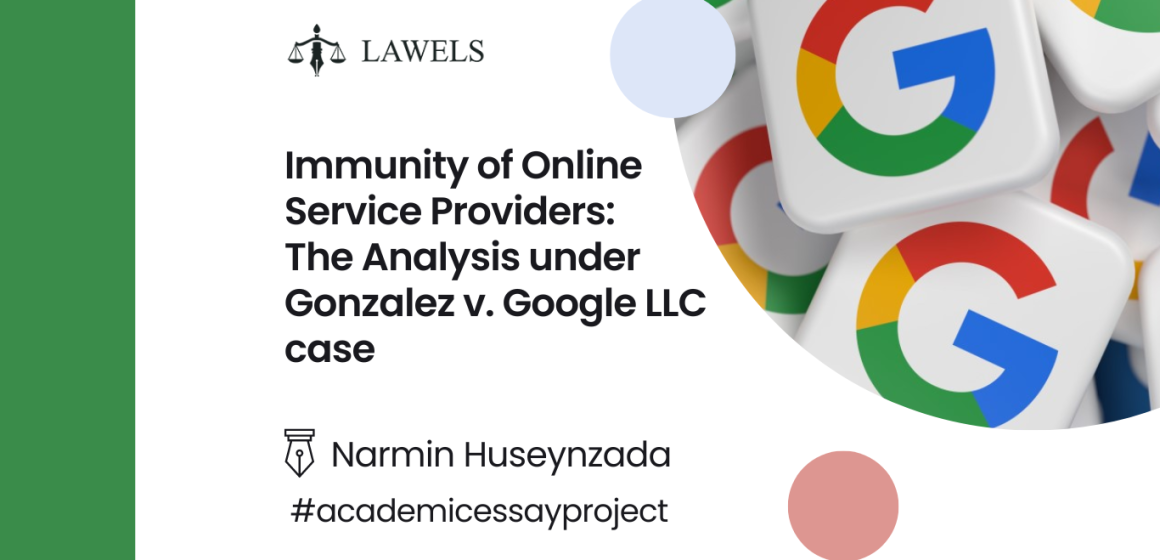Author: Narmin Huseynzada, LLB, Baku State University, 2016-2020
Editor: Bader Kabbani, LLM International Commercial and Economic Law, SOAS, University of London, 2020-2021
Abstract
Section 230 of the Communications Decency Act (CDA), protects online service providers from liability for third-party’s content. Although there are some exceptions to this rule, generally, service providers enjoy broad immunity against all kinds of claims. The analysis of the Gonzalez v. Google, Inc case shows that the broad interpretation of the immunity under Section 230 creates new challenges in practice. Plaintiffs of the case and other supporters of their opinion rely on the fact that recommending some content over others makes the service providers a publisher of the content. The Supreme Court of the United States will consider this question. This article argues that making some editorial functions does not amount to publishing.
Introduction
The content that is published through the Internet is hardly controllable by the service providers. For instance, 350 million photos are uploaded on Facebook every day [1], on average, more than 150, 0000 new videos are uploaded to YouTube every minute [2]. Making the online service providers directly liable for illicit content created barriers to the development of the Internet, and forced companies to apply strict rules on published content. For this reason, Congress has passed Section 230 of the CDA, which immunizes online service providers from claims related to the contents that are published by third parties. Section 230(c) (1) says that “no provider or user of an interactive computer service shall be treated as the publisher or speaker of any information provided by another information content provider”. Section 230 achieved its main goal, incentivized the growth of the Internet and created an environment for free speech. However, since 1996, the development of technology created new challenges and given rise to the question of whether online service providers should enjoy such a broad immunity in all circumstances. Gonzalez v. Google LLC case fueled this problem and divided people who support broad interpretation, and who argue it is too much.
Analysis Gonzalez v. Google LLC
In 2015, Nohemi Gonzalez died as a result of a terror attack that occurred in several parts of Paris, France. After the incident, ISIS took responsibility by making a written statement and sharing a video on YouTube. Father of Gonzalez sued Google and the parent company of YouTube, for recommending terrorist videos to other users through the platform. The plaintiff argued that even though Google is not a creator of the alleged ISIS video, it assisted ISIS to spread its messages by recommending videos to other viewers who might be interested. Google won in district court hearings. The plaintiffs appealed, but the Ninth Circuit upheld the district court’s ruling that Section 230 of the CDA barred Gonzalez’s claims against Google. The court explained that the CDA provides immunity to interactive computer services for claims that treat the service as the publisher or speaker of third-party content. The court further continued that the CDA’s immunity provision applies even when the interactive computer service knows of the objectionable content or fails to remove it. Because online service providers act as intermediaries between users and content creators, providing a platform for users to access and share videos. While they may have some control over the presentation and organization of videos on their platform, they do not create or produce the videos themselves.
Regarding the recommending function, “the platforms do not become content creators or developers simply by “supplying ‘neutral tools’ that deliver content in response to user inputs.” [3]. In Barnes v. Yahoo!, the Ninth Circuit stated that “publication involves reviewing, editing, and deciding whether to publish or to withdraw from publication third-party content.” [4]. As it seems, “recommending” does not fit this definition, because not the platforms, but the algorithms “decide” what to recommend to users. Algorithms use viewing history of users or other data points to generate relevant feeds for them. If the Supreme Court interpreters Section 230 in favour of the plaintiffs, service providers will be obliged to change how the algorithm works. This will significantly reduce user management.
Plaintiffs further continued that Congress has passed the law limiting the liability of service providers who act in good faith. However, over the years courts applied this immunity as an absolute one. Here, it should be noted that the CDA’s immunity provision is critical for fostering the growth of the internet and encouraging interactive computer services to provide a platform for diverse viewpoints, even controversial ones. However, considering the sensitivity of the content in Gonzalez, the lawmakers can make amendments to Section 230 like Stop Enabling Sex Traffickers Act (FOSTA-SESTA) exempted the immunity to remove material violating federal and state sex trafficking laws. Another solution may be as Danielle Citron and Benjamin Wittes suggested to make service providers liable if they fail to take “reasonable steps to address known unlawful uses of its services that create serious harm to others” [5]. This can strengthen public trust while still protecting service providers if they acted in good faith.
Conclusion.
All in all, the Gonzalez case is significant because it reaffirms the broad scope of Section 230 immunity for interactive computer services. Online service providers typically use algorithms to recommend videos to users based on their viewing history or other data points, but this does not mean that they have editorial control over the content of those videos. Overall, recommending videos to users does not necessarily make online service providers the publishers of those videos, but they may still have legal obligations and responsibilities related to the content that is posted on their platform.
References
- Truelist Blog, Facebook Statistics – 2023, https://truelist.co/blog/facebook-statistics
- Wyzowl, YouTube Stats: Everything You Need to Know In 2023!, https://www.wyzowl.com/youtube-stats/
- Tomer Kenneth and Ira Rubinstein, Gonzalez v. Google: The Case for Protecting ‘Targeted Recommendations’, p. 11, https://papers.ssrn.com/sol3/papers.cfm?abstract_id=4337584
- Barnes v. Yahoo!, Inc., 570 F.3d 1096 at 1102 (9th Cir. 2009)
- Danielle Keats Citron and Benjamin Wittes, Fordham Law Review, The Internet Will Not Break: Denying Bad Samaritans § 230 Immunity, https://ir.lawnet.fordham.edu/cgi/viewcontent.cgi?article=5435&context=flr
Bibliography
- Tomer Kenneth and Ira Rubinstein, Gonzalez v. Google: The Case for Protecting ‘Targeted Recommendations’, https://papers.ssrn.com/sol3/papers.cfm?abstract_id=4337584
- Danielle Keats Citron and Benjamin Wittes, Fordham Law Review, The Internet Will Not Break: Denying Bad Samaritans § 230 Immunity, https://ir.lawnet.fordham.edu/cgi/viewcontent.cgi?article=5435&context=flr
- Congress Research Service Legal Sidebar, Liability for Content Hosts: An Overview of the Communication Decency Act’s Section 230, June 6, 2019, https://crsreports.congress.gov/product/pdf/LSB/LSB10306
- Gonzalez v. Google LLC, 2 F. 4th 871 (9th Cir., 2021) cert. granted, No. 21-1333, 2022 WL 4651229 (U.S. Oct. 3, 2022), and cert. granted sub-nom. Twitter, Inc. v. Taamneh, No. 21-1496, 2022 WL 4651263 (U.S. Oct. 3, 2022), https://www.supremecourt.gov/DocketPDF/21/211333/220254/20220404211548101_GonzalezPetPDF.pdf
- Justia Us Law, Gonzalez v. Google, LLC, No. 18-16700 (9th Cir. 2021), https://law.justia.com/cases/federal/appellate-courts/ca9/18-16700/18-16700-2021-06-22.html
This article is written within the Academic Essay Project (AEP) organised by LAWELS. AEP aims to increase the number of quality academic writings on legal topics, encourage young lawyers to participate in academic writing, and lay the foundation of an online database on legal science. The team of legal editors and legal writers share their knowledge through high-end essays that we are publishing on our website and social media accounts for the world to read and learn from.
The articles on the LAWELS platform are not, nor are they intended to be legal advice. You should consult a lawyer for individual advice or assessment regarding your own situation. The article only reflects the views of the author.


